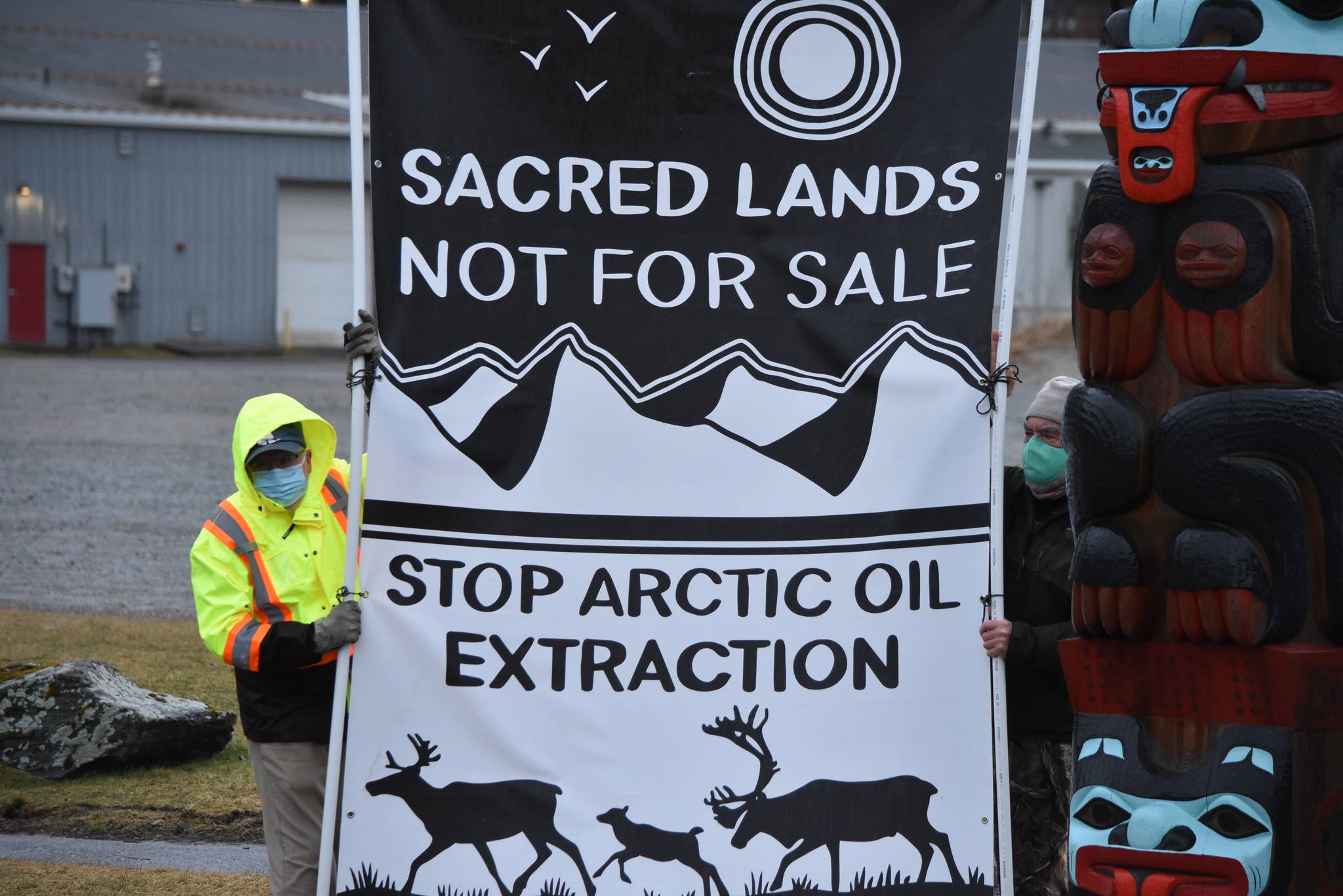Environmentalists in Juneau displayed a banner protesting oil drilling in the Arctic as part of a nationwide day of action planned by conservation-minded and Indigenous rights groups.
Undaunted by a judge’s decision the day before against their cause, members of environmental groups 350Juneau and Native Movement displayed on Wednesday a large banner protesting Arctic drilling at several locations in Juneau including Saviko Park and the Alaska State Capitol.
Similar “banner drops” were happening around the world, according to 350Juneau member Elaine Schroeder, who told the Empire she believed fossil fuel extraction needs to stop to avoid a climate catastrophe. Native Movement, an environmental group with a focus on Indigenous rights, held similar banner drops in October. The banners — the same ones were used Wednesday — read: “Sacred Lands Not For Sale. Stop Arctic Oil Extraction” and were displayed across the state during last year’s event, and as far away as London.
Demonstrators began at Saviko Park before driving off to display the banner at other locations in Juneau, ending at the Mendenhall Glacier Visitor Center.
Schroeder said any benefits that come from the fossil fuel industry were outweighed by the future costs of extreme environmental damage.
“Any argument about jobs misses the point,” Shroeder said. “There are no jobs on a dead planet.”
[Banner day: Activists display anti-drilling message throughout state]
The Trump administration announced last month it would sell leases for oil and gas extraction in ANWR, a long-debated and controversial move met immediately with lawsuits trying to prevent the sales from moving forward. On Tuesday a federal judge denied a request by plaintiffs to halt the sales, and while that decision was disappointing, the environmentalists gathered in the cold wind Wednesday morning even as lease sales were happening didn’t seem to feel their cause was doomed.
The Alaska Industrial Development and Export Authority was the sale’s main bidder Wednesday morning, according to the Associated Press. Its executive director, Alan Weitzner, in a statement, said in acquiring nine tracts, “Alaska preserves the right to responsibly develop its natural resources.”
AIDEA’s board of directors approved spending up to $20 million to buy oil leases at a meeting last month, according to a news release from the organization.
“It’s unfortunate, but I think in the long term it was not something that was coming anyway,” said Naawéiyaa Tagaban, Southeast Community Organizer with Native Movement. “There’s still lots of people who have hope the Biden administration will do something.”
Tagaban said the movement is resonating with people around the world because environmental impacts in Alaska affected the rest of the world.
“We live in a moment of climate crises,” he said. “(The movement) resonates with people because what happens in the Arctic happens to the world and people care about indigenous rights.”
[Judge allows oil, gas lease sales in Arctic National Wildlife Refuge]
The lands for sale are the traditional homeland of the Gwich’in and Inupiat peoples, and according to Native Movement,should be considered not only protected but sacred. The burden of fighting the extractive industry has fallen on grassroots Indigenous organizers for far too long, Native Movement says on their website, and these communities face the greatest impacts of the climate crisis.
“StandWithTheGwich’in” was trending on social media Wednesday, with Democratic U.S. House of Representatives members from Arizona, California and New Hampshire expressing support for the movement on Twitter.
An oil/gas lease sale in the Arctic Refuge is an attack on the human rights of the Gwich’in people who rely on the Porcupine caribou as a traditional food source, caribou that use the refuge’s coastal plain as their calving grounds. #ProtectTheArctic #StandWithTheGwichin pic.twitter.com/TWvA9GWnlZ
— Rep. Ann Kirkpatrick (@RepKirkpatrick) January 5, 2021
Schroeder said 350Juneau didn’t typically use the term “sacred lands” but the phrase resonated with her because she views ANWR as a precious resource for the entire planet.
“We Alaskans are not privileged that we can extract resources that destroy the rest of the world,” she said.
• Contact Peter Segall at psegall@juneauempire.com.

